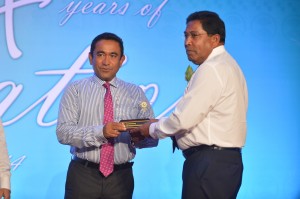Ruling Progressive Party Maldives’ (PPM) parliamentary group leader Ahmed Nihan has defended police brutality during a People’s Majlis debate today, accusing opposition MPs of putting up an act using tomato sauce to pretend police beat them up.
“Honorable Speaker, police did not beat them enough. Those who say they were brutalised, came to Majlis the next day in good health with makeup on. Their health is better than before. How can anyone who was brutalised get up on their two feet and speak on this Majlis floor [the next day]?” he said.
“They say they were brutalised, bloodied, and put on a drama on hospital beds, smear themselves with tomato sauce, and take photos and the next day they speak perfectly well at this Majlis and go off.”
Nihan appeared to be referring to police officers brutalizing several opposition MPs during a demonstration following the controversial ouster of former President Mohamed Nasheed.
On February 8, MPs including MPs Mariya Ahmed Didi, Reeko ‘Moosa’ Manik, Eva Abdulla and former MP Mohamed ‘Bonda’ Rasheed were severely beaten.
Nihan’s comments came during a debate on revising clauses in the 2008 Police Act that state the police must forward criminal cases to the Attorney General (AG) for prosecution.
The amendments – accepted by the Majlis today – propose placing prosecutor general (PG) instead of AG in clauses relating to prosecution, as the Constitution of 2008 states only the PG can press charges on behalf of the state.
Nihan said opposition MPs had politicised the issue by digressing from the debate and focusing on police brutality.
Death of officers
Nihan also suggested the deaths of police officers, Adam Haleem on Kaafu Atoll Kaashidhoo Island in 2012 and Misbah Abdulla in Malé in 2013 were linked to opposition’s defaming of the Maldives Police Service.
Referring to Haleem’s murder, Nihan said: “This is the result of a specific people protesting and calling for attacks on Maldivian police and soldiers during that week and weeks before that.”
Haleem was stabbed to death in July 2012 and several government officials including current Vice President Dr Mohamed Jameel Ahmed blamed the MDP for the death. The MDP said the government was politicising the death for political gain.
Abdulla was killed in an accident after a speeding motorcycle hit him while he was manning a vehicle checkpoint.
“In every event, in every discussion, [they say police] are brutal, arresting – were you arrested when you were prostrating [in prayer]?” Nihan said.
“Harassing police is harassing us, playing with our arteries, our blood,” he continued.
Police Brutality
On August 6, AG Mohamed Anil told parliament five February 8 brutality cases involving four police officers are ongoing at the Criminal Court.
At minister’s question time, MP Eva Abdulla asked how far investigations into police brutality – as recommended by the 2012 Commission of National Inquiry’s (CoNI) – had progressed.
“With respect to the administration of justice, in particular concerning allegations of police brutality and acts of intimidation, there is an urgent need for investigations to proceed and to be brought to public knowledge with perpetrators held to account and appropriately sanctioned,” read the second recommendation of the report.
While it concluded that the transfer of presidential power was constitutional, CoNI had found that “there were acts of police brutality on 6, 7 and 8 February 2012 that must be investigated and pursued further by the relevant authorities.”
Anil explained that the Police Integrity Commission (PIC) had investigated 45 cases of alleged police brutality and made a recommendation to the home ministry to dismiss six police officers. However, only one officer was sacked, Anil said.
February 8
Thousands of MDP supporters took to the streets of Malé on February 8, 2012, in a protest march after former President Nasheed declared his resignation the previous day had come “under duress” in a “coup d’etat” instigated by mutinying police officers of the Special Operations (SO).
Following an investigation, the Human Rights Commission of Maldives (HRCM) concluded that the heavy-handed police crackdown on the MDP walk was “brutal” and “without warning.”
The HRCM recommended the PIC investigate the “disproportionate” use of force that left dozens of demonstrators injured and hospitalised.
In May 2013, the PG’s Office pressed charges against two police officers accused of assaulting MDP MPs ‘Reeko’ Moosa Manik and Mariya Ahmed Didi during the violent crackdown.
Amnesty International meanwhile warned that failure to prosecute police officers accused of human rights abuses and “serious failings in the justice system entrenched impunity”.
In June 2013, former PIC member Hala Hameed told parliament’s government oversight committee that the cases involving the six police officers were “not disciplinary issues, but crimes,” expressing concern with the home minister’s refusal to suspend the officers.
Moreover, former PIC Chair Shahinda Ismail told Minivan News in September 2012 that a staff sergeant caught on tape kicking a fallen demonstrator “was promoted after this incident.”
In February this year, Shahinda told Minivan News that detainees arrested in Addu City on February 9 were “forced to walk on smoldering coals”.
According to the HRCM report, 32 people filed complaints concerning varying degrees of injuries sustained in the crackdown, while 20 people submitted medical documents of their treatment of injuries.
Two fingers on the left hand of one demonstrator were crushed, the report noted.
Al Jazeera filmed parts of the crackdown, reporting that “police and military charged, beating demonstrators as they ran – women, the elderly, [with] dozens left nursing their wounds”. The BBC meanwhile reported “a baton charge by police on crowds gathered outside one of the main hospitals.”
In a report in May 2013, the UN Special Rapporteur for Independence of Judges and Lawyers Gabriela Knaul warned that there could be more instability and unrest unless serious human rights violations of Maldives’ authoritarian past are addressed.
Likes (1)Dislikes
(1)Dislikes (0)
(0) 

